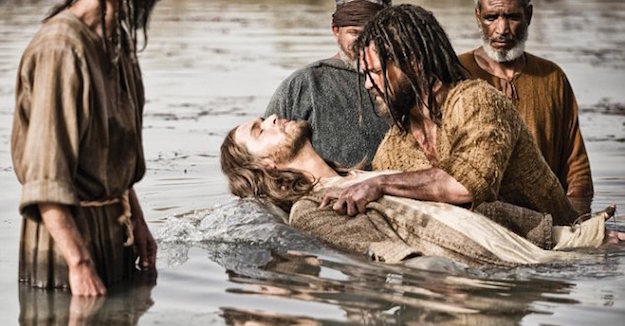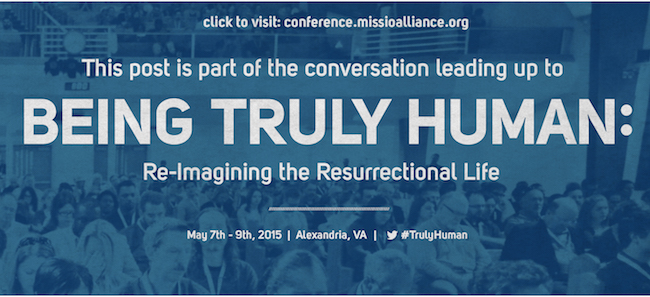Katniss Everdeen, of the Hunger Games, was the perfect revolutionary hero because she wasn’t trying to be a revolutionary hero. Those revolting against the Capital City wanted her because she came from among the common people. She was not some savvy politician or accomplished military strategist. She was just a girl trying to survive like everyone else.
Within the world of Hunger Games, and even for those who watch and read it, Katniss comes across like you and me: caring about family, confused by love, and just trying to live. She is human, all too human.
(And this is exactly why I’ve never been able to enjoy Superman. He just isn’t very human at all. I can’t identify with him.)
And when it comes to our own salvation, the revolution over the kingdom of sin and death (Rom. 5), we find we have one who identifies with us in every way, for in Jesus we do not have one who “is unable to sympathize with our weaknesses, but we have one who in every respect has been tested as we are, yet without sin” (Heb. 4:15).
Indeed, Jesus shows us what it means to be truly human.
Which leads us to Jesus’ baptism.
Jesus’ Baptism
Why Jesus was baptized?
If John the Baptist was offering a baptism for the repentance of sins, why was Jesus baptized if he is without sin (Heb. 4:15)?
To understand we must think beyond personal sin and think of social, cultural, or systemic sin. If Jesus truly took on humanity (took on the meat of flesh as John 1:14 says), then while he might not have sinned personally, he was still within the world of systemic sin: the world of domination and exploitation, of disease and death, of pain and sorrow.
In his baptism Jesus identifies as truly human, as truly within this system, so that he could truly change it.
In his baptism Jesus both reveals that he has taken on the human condition and becomes the one who will lead us from the land of sin and death into the land of life and peace (it is no mistake that Jesus was baptized in the Jordan, the same place the people of God entered the promised land).
But while Jesus identifies with the humanity as we are,
he offers to lead us into the humanity we could be.
Jesus’ Blessing
And what is this “humanity we could be”?
It is to live in the blessing of God as the children of God. God blessed Adam and Eve to multiply and fill the earth (Gen. 1:28), and God called and blessed Abraham to be a blessing to all peoples (Gen.12: 1-4).
And while Jesus was being baptized and praying (that he was praying is a whole other post!), “the heaven was opened, and the Holy Spirit descended upon him in bodily form like a dove. And a voice came from heaven, “You are my Son, the Beloved; with you I am well pleased” (Luke 3: 21-22).
These words spoken over Jesus (1) uniquely identify Jesus as the Messiah and eternal Son of the Father, and (2) are the promised words spoken to all who are children of God.
In Jesus we receive again the blessing given to Adam and Eve, a blessing promised through Abraham to flow to all nations.
In Jesus we can again become the humanity that we were created to be.
Jesus identifies with the humanity as we are in Baptism, and leads us into the humanity we could be in his being Blessed.
Our Humanity
Certainly we must affirm the divinity of Jesus (as is often done through his baptismal narrative).
But we must also remember the humanity of Jesus. For it is in and through the humanity of Jesus that we learn to live #trulyhuman.
Do you look to Jesus for your true humanity, or just to deliver you from your depravity? In his Baptism we see that Jesus intends to do both.










Missio Alliance Comment Policy
The Missio Alliance Writing Collectives exist as a ministry of writing to resource theological practitioners for mission. From our Leading Voices to our regular Writing Team and those invited to publish with us as Community Voices, we are creating a space for thoughtful engagement of critical issues and questions facing the North American Church in God’s mission. This sort of thoughtful engagement is something that we seek to engender not only in our publishing, but in conversations that unfold as a result in the comment section of our articles.
Unfortunately, because of the relational distance introduced by online communication, “thoughtful engagement” and “comment sections” seldom go hand in hand. At the same time, censorship of comments by those who disagree with points made by authors, whose anger or limited perspective taints their words, or who simply feel the need to express their own opinion on a topic without any meaningful engagement with the article or comment in question can mask an important window into the true state of Christian discourse. As such, Missio Alliance sets forth the following suggestions for those who wish to engage in conversation around our writing:
1. Seek to understand the author’s intent.
If you disagree with something the an author said, consider framing your response as, “I hear you as saying _________. Am I understanding you correctly? If so, here’s why I disagree. _____________.
2. Seek to make your own voice heard.
We deeply desire and value the voice and perspective of our readers. However you may react to an article we publish or a fellow commenter, we encourage you to set forth that reaction is the most constructive way possible. Use your voice and perspective to move conversation forward rather than shut it down.
3. Share your story.
One of our favorite tenants is that “an enemy is someone whose story we haven’t heard.” Very often disagreements and rants are the result of people talking past rather than to one another. Everyone’s perspective is intimately bound up with their own stories – their contexts and experiences. We encourage you to couch your comments in whatever aspect of your own story might help others understand where you are coming from.
In view of those suggestions for shaping conversation on our site and in an effort to curate a hospitable space of open conversation, Missio Alliance may delete comments and/or ban users who show no regard for constructive engagement, especially those whose comments are easily construed as trolling, threatening, or abusive.